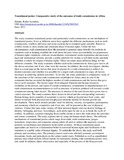| dc.description.abstract | The study examines transitional justice and particularly truth commissions as one mechanism of transitional justice. Even as different states have applied the different mechanisms such as truth commissions, conflicts still recur and some societies have remained quite unstable. Return to conflict results to more deaths and continued abuse of human rights. Under the best circumstances, truth commissions have the potential to generate many benefits for societies in transition such as helping establish the truth about the past, foster accountability for perpetrators of human rights violations, cultivate reconciliation, recommend victim reparations and necessary legal and institutional reforms, provide a public platform for victims to tell their stories and help establish a culture for respect of human rights. These outcomes mean different things for the different countries.
The study examines whether each truth commission in Africa gave rise to all the above outcomes and if not, what were the reasons. In addition, the study investigates whether there is a road map on the factors that must be present for a truth commission to achieve its desired outcomes and whether it is possible for a single truth commission to enjoy all factors necessary in achieving desired outcomes. To do this, the study undertakes a comparative study of the outcomes of the various truth commissions established in Africa since its one of the continents that has recorded the highest number of truth commissions and the factors that gave rise to such outcomes. The factors range from adequate financial and human resources, credibility in the process and report of a truth commission, commitment to implementation of a truth commissions recommendations as well as precence of positive political will towards a truth commission among other factors. The presence or absence of the said factors have given rise to varied outcomes.
The study examines these factors in detail and the corresponding outcomes. Human beings need a number of essentials to survive which go beyond just food, water, and shelter to include both physical and non physical elements needed for human growth and development. These needs include peoples' need for identity, security, recognition, participation, and autonomy which are compulsive and if not met, will be pursued at the cost of physical violence. Crimes like rape strips victims off their personal dignity and can destroy feelings of identity, belonging and trust. Accordingly, such needs must be met so as to break the cycle of conflict. In addition, societies emerging from conflict desire to know the truth about the atrocities and crimes committed. The study explains this by using the human needs theory. The different mechanisms of transitional justice which range from trials, truth commissions, purges, lustrations, forgiveness and amnesties among others all seek to address the injustices caused, promote reconciliation and ultimately build stable societies. All these transitional justice approaches are based on a fundamental belief in universal human rights and facilitation of the transition to a public order of human dignity.
To undertake the above, the study used both primary and secondary data. The primary sources used were scholarly journals, government documents, books and periodicals on the subject under study. Published as well as unpublished primary data which include official reports by institutions dealing with transitional justice were . also used. In addition, direct observation and especially of the process of the Kenyan truth commission which was in operation at the time of the study was used. The findings of the study were that truth commissions do not operate in a vacuum as various factors both within and outside the control of a truth commission come to play. The study found out that it is difficult for one commission to enjoy the precence of all necessary factors. This meant that none of the truth commissions gave rise to all the desired outcomes. The various factors either present or absent during the pre, during and post a truth commission process give rise to varied outcomes. As a consequence, truth commissions may not be a wholesale solution to a country's problems. | en_US |

